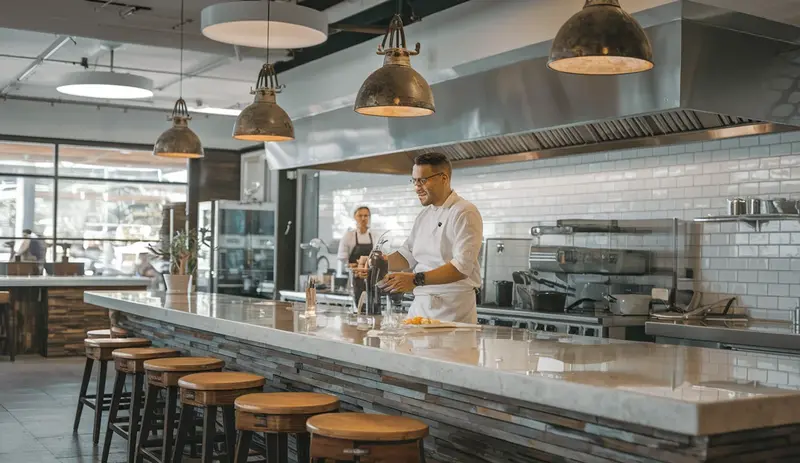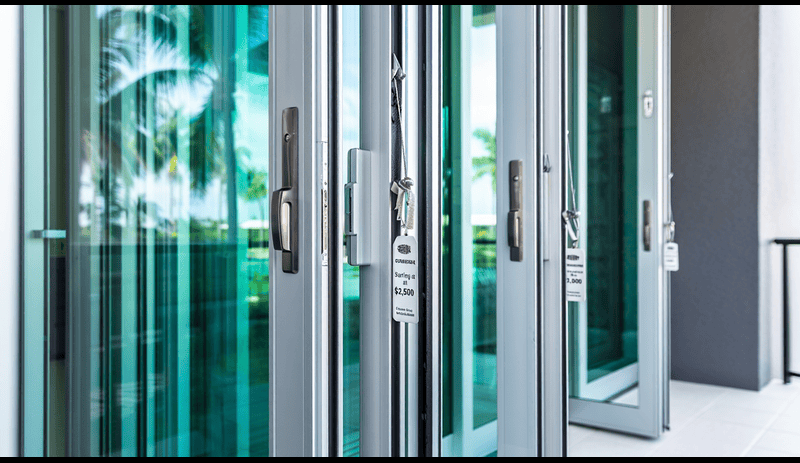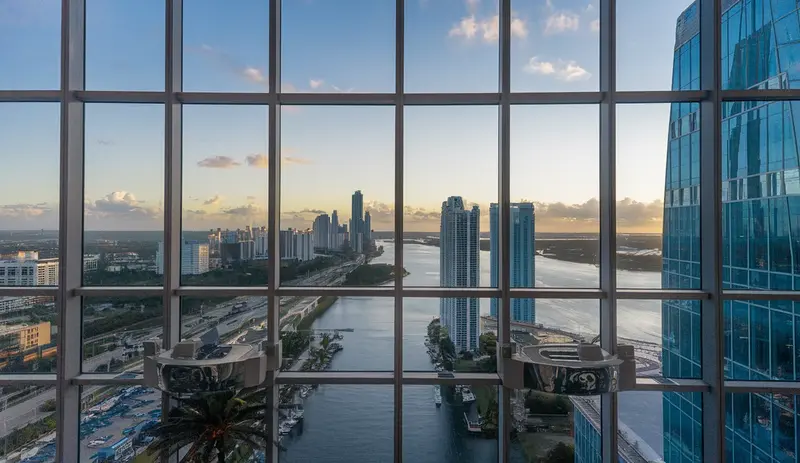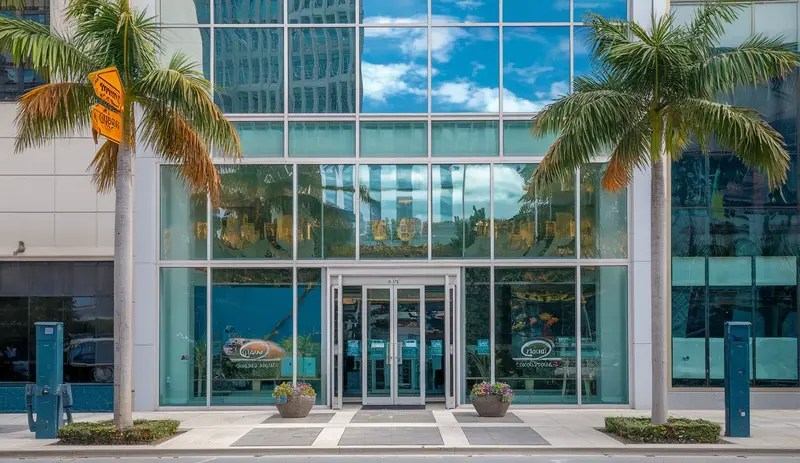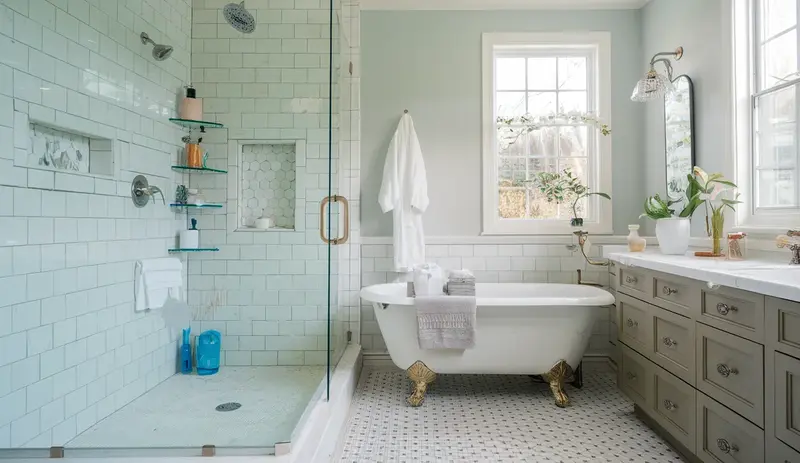Commercial kitchens face unique challenges when it comes to glass installation. Extreme temperatures, constant moisture, health code requirements, and potential impact risks make glass selection critical for Florida food service spaces.
Restaurant owners and kitchen managers need specialized glass solutions that can withstand the demanding environment of professional cooking areas.
This comprehensive guide will explore the specific considerations for glass use in commercial kitchens, highlighting safety, durability, and compliance requirements unique to Florida’s food service industry. We’ll break down everything you need to know about selecting, installing, and maintaining glass in high-stress kitchen environments.
Understanding Glass Requirements in Commercial Kitchen Environments
In a kitchen, glass must survive fast temperature jumps. Think moving a tray from a freezer at 0 °F straight onto a grill that hits 500 °F. If the glass can’t handle that change, it may crack. A cracked pane can ruin food, slow service, and cut people.
Glass also has to take hits. Dropping a pan, bumping a cart, moving heavy equipment – all these can smack the glass. A good pane should absorb the hit without breaking.
When glass does both jobs – resists heat and survives impact – it works like an invisible helper in the kitchen.
Types of Glass Suitable for Commercial Kitchen Applications
Tempered safety glass is heat‑treated so it is about five times stronger than normal glass. If it does break, it falls apart into tiny pieces that aren’t sharp. That makes it a first choice for busy spots.
Heat‑resistant glass is built to touch hot cooking surfaces. It won’t melt or bend even near a big oven or steamer. Some call it the “Navy SEAL” of kitchen glass because it keeps going under extreme heat.
Laminated glass has two (or more) sheets glued together with a strong middle layer. If the outer sheet cracks, the middle holds everything in place. It also cuts down on noise.
At Starlite Glass, we understand each type has good points, but not every kind works well in Florida’s kitchens. You have to match the glass to both the job and the local climate.
Continue with this: How Tall Can Storefront Glass Be in Florida?
Florida‑Specific Installation Considerations for Kitchen Glass
Humidity in Florida is high. It can rust metal frames and wear down sealants. Installers should use rust‑proof hardware – stainless steel or coated metal – and apply sealants that keep water out.
Hurricanes add another worry. Glass must be fastened with strong brackets and continuous frames. Some locations even need impact‑rated glass that meets the state’s hurricane standards.
Temperature swings also affect glass. When the weather gets hotter or cooler, glass expands or shrinks. Professionals use flexible gaskets, expansion joints, and silicone sealants so the glass can move a little without cracking.
Maintenance and Long‑Term Care for Commercial Kitchen Glass
Cleaning the glass often keeps it looking good and working well. Use soft cloths or brushes and a mild, kitchen‑safe cleaner that removes grease but does not eat the surface. Avoid strong chemicals like ammonia or vinegar; they can damage tempered or laminated panes.
Every few months, have a pro come out to check the glass. They should look for tiny cracks, chips, bad seals, or any wear on the surface. Spotting problems early lets you fix them before the pane shatters.
Safety Regulations and Compliance for Commercial Kitchen Glass
Florida health rules say glass in food‑service places must meet safety standards. You need regular inspections, good paperwork, and staff training for emergencies. A handy checklist might include:
- Date the glass was installed
- Type of glass and its specs
- All maintenance records
Keeping this file up to date satisfies the health inspectors and helps you see how the glass is doing over time. Following the rules makes the kitchen safer for workers, customers, and the business itself.
Conclusion
Knowing the extreme heat and impact needs of a kitchen, picking glass that can act like a culinary superhero or a Navy SEAL, and using Florida‑specific installation tricks are the first steps to a strong glass system.
Add regular cleaning, routine inspections, and follow the state’s safety codes, and you get a safety net that keeps the kitchen running, cuts downtime, and protects public health. For Florida restaurant owners, the right glass is more than just clear panels – it is a vital part of a strong, successful kitchen.
Recap the critical considerations for glass use in commercial kitchens. Emphasize the importance of professional consultation and expert installation to ensure safety, durability, and compliance.
Always prioritize safety and compliance, work with experienced commercial glass installers, maintain regular maintenance, and choose glass specifically designed for commercial kitchen environments.

